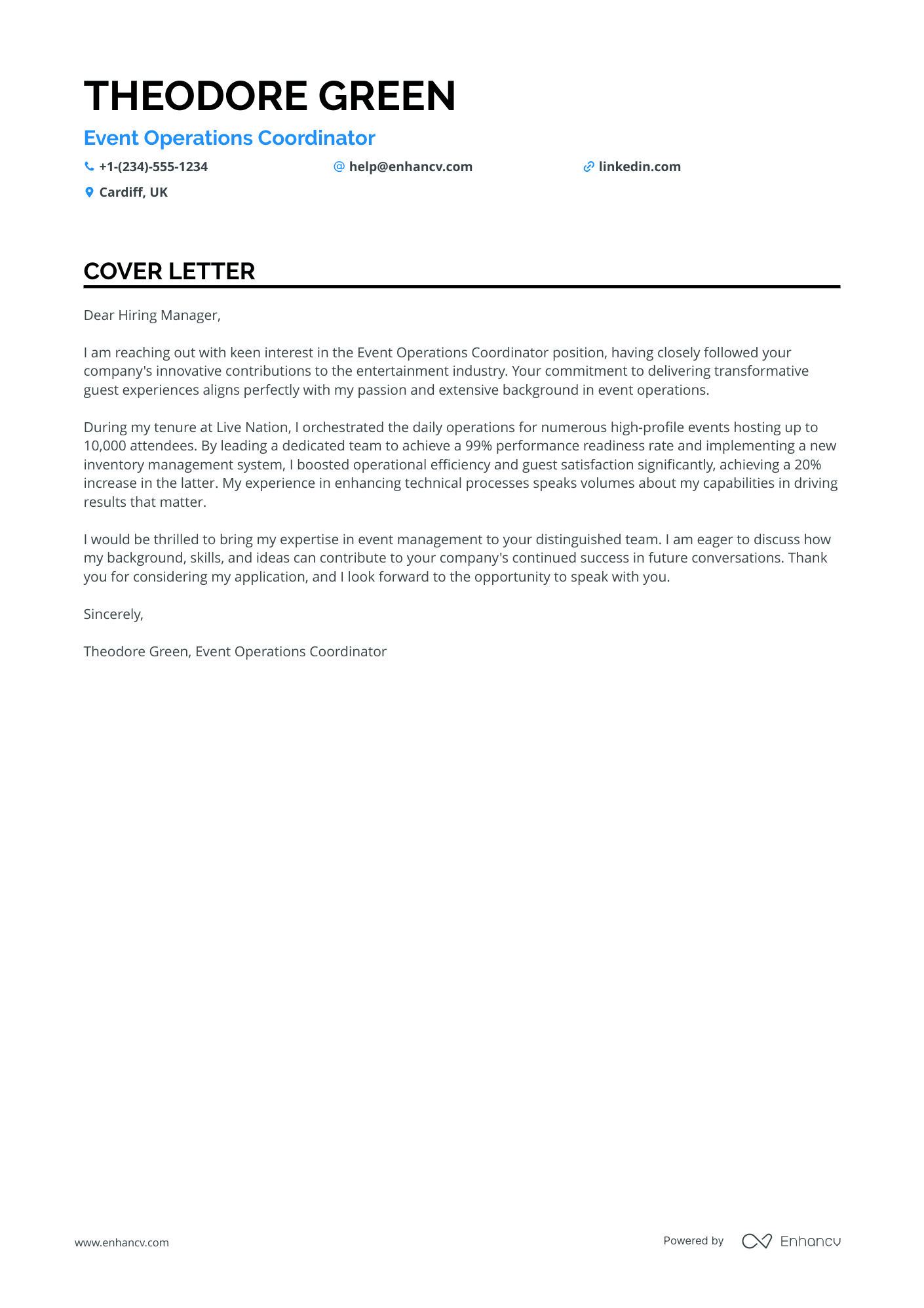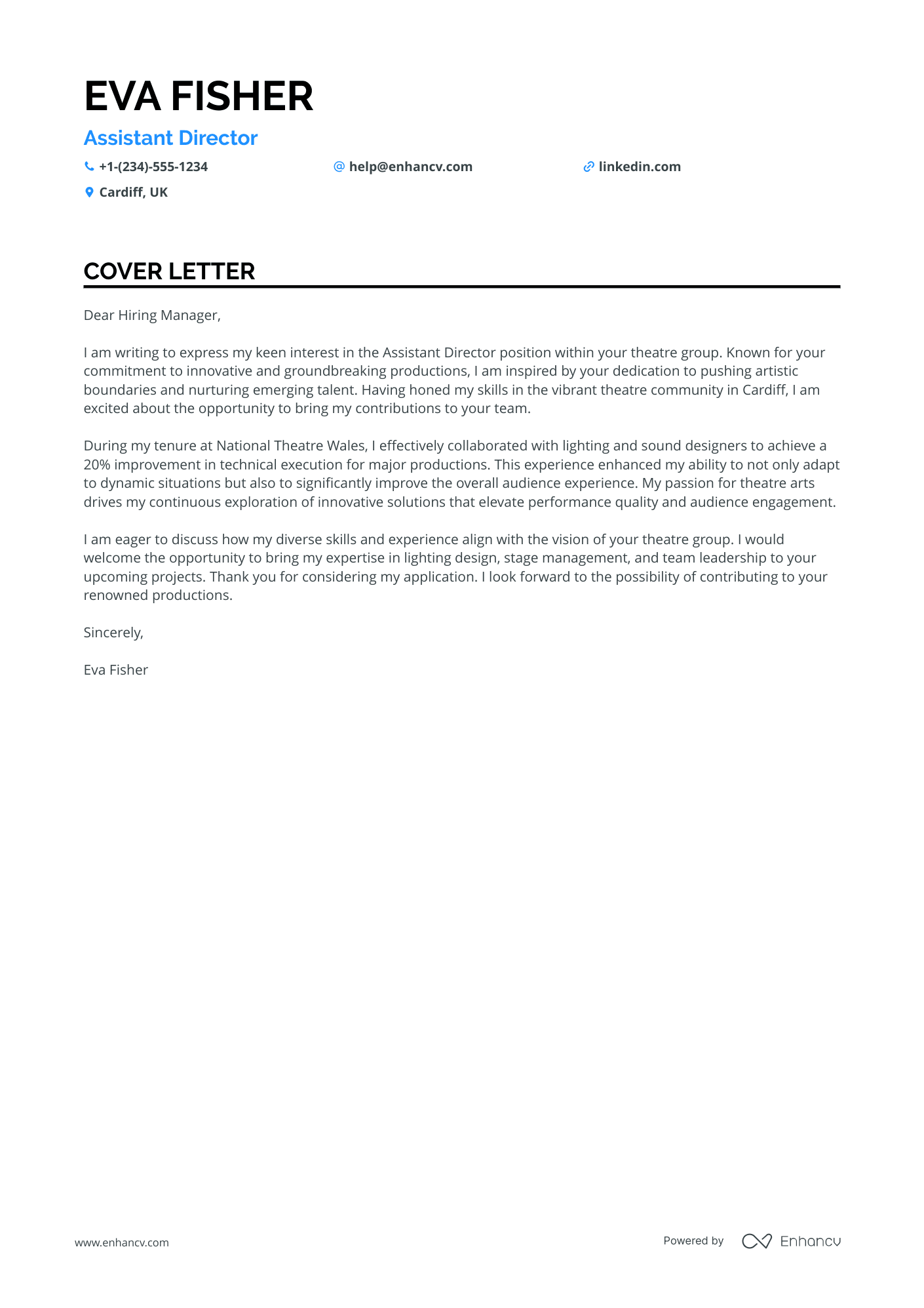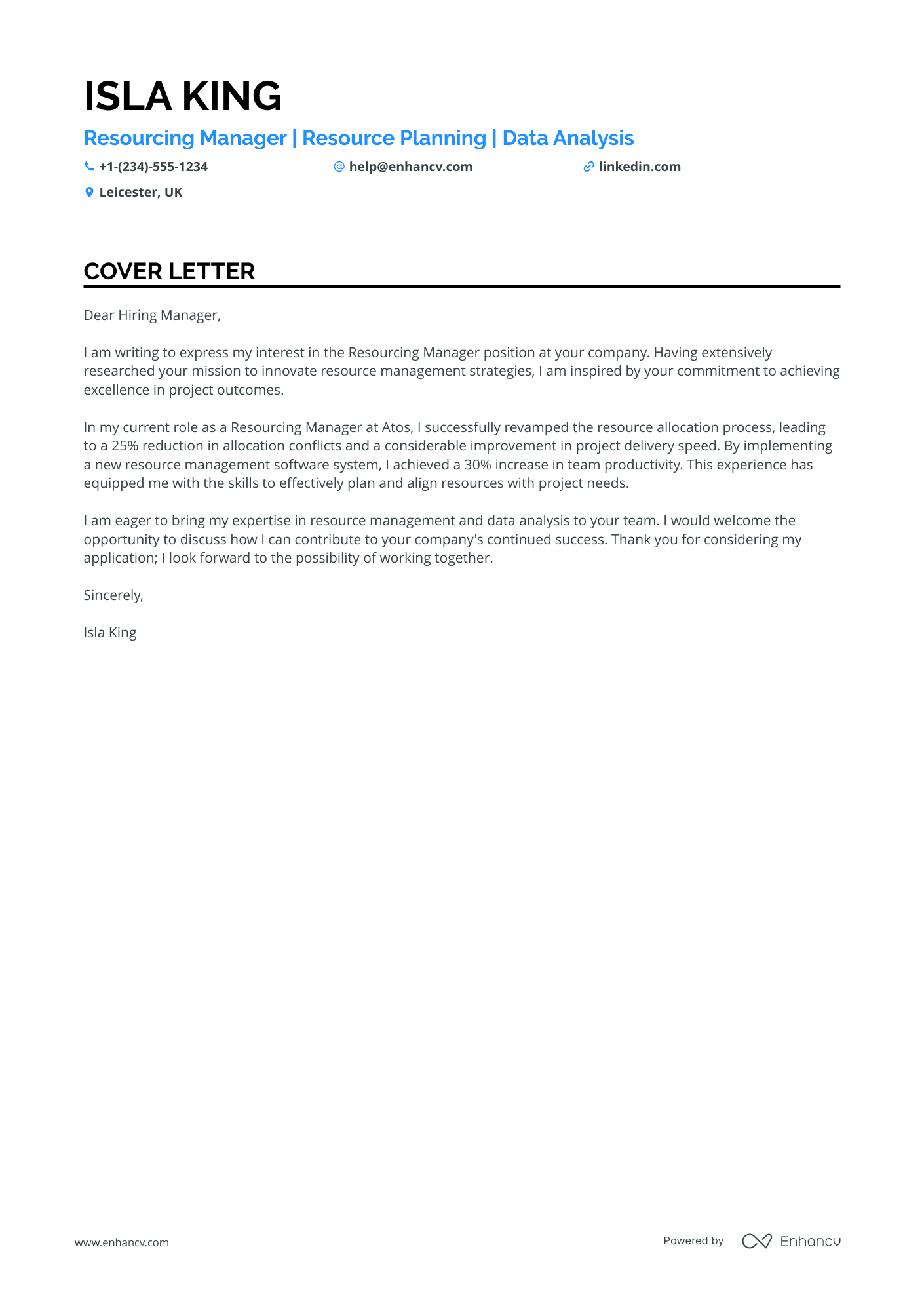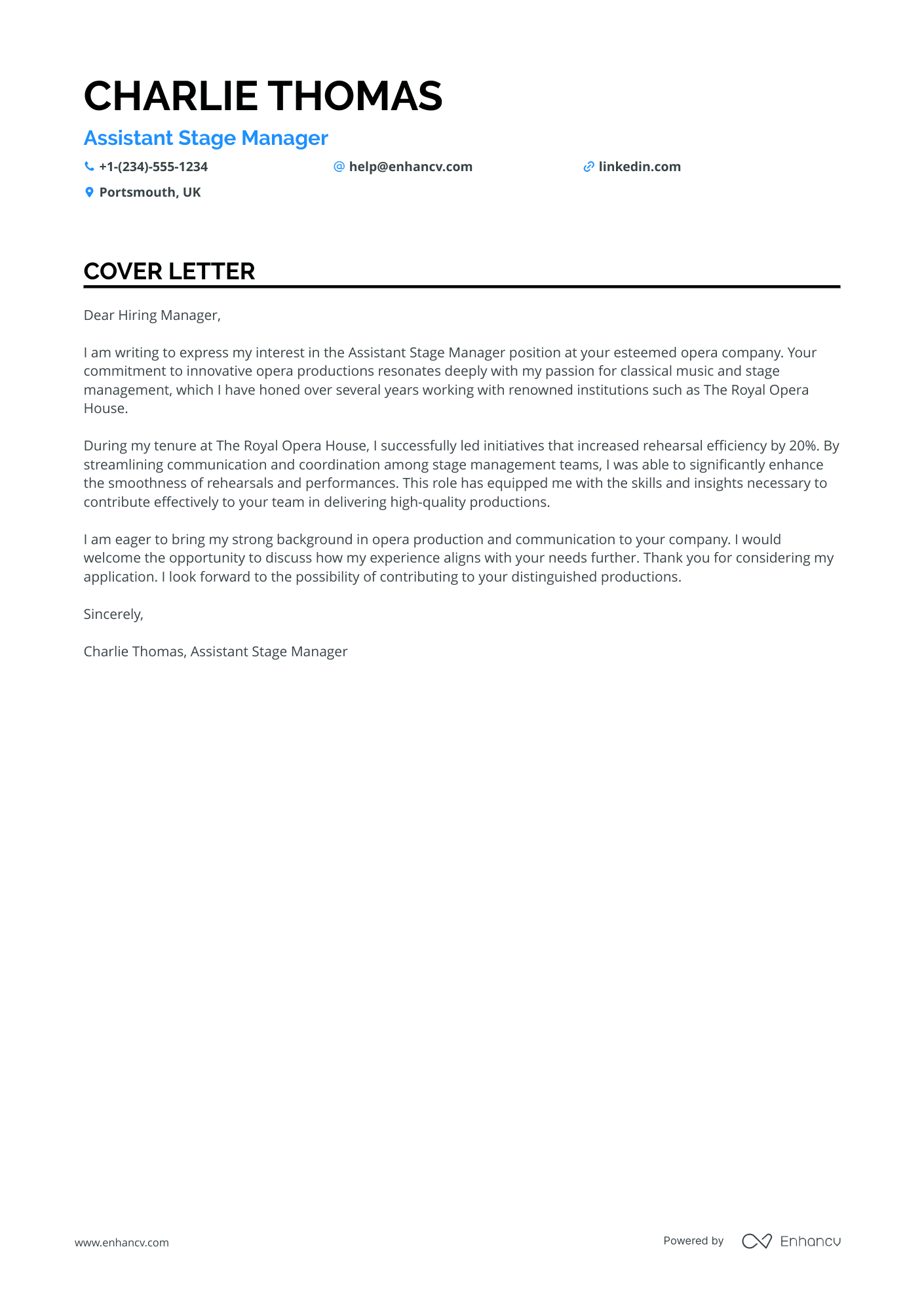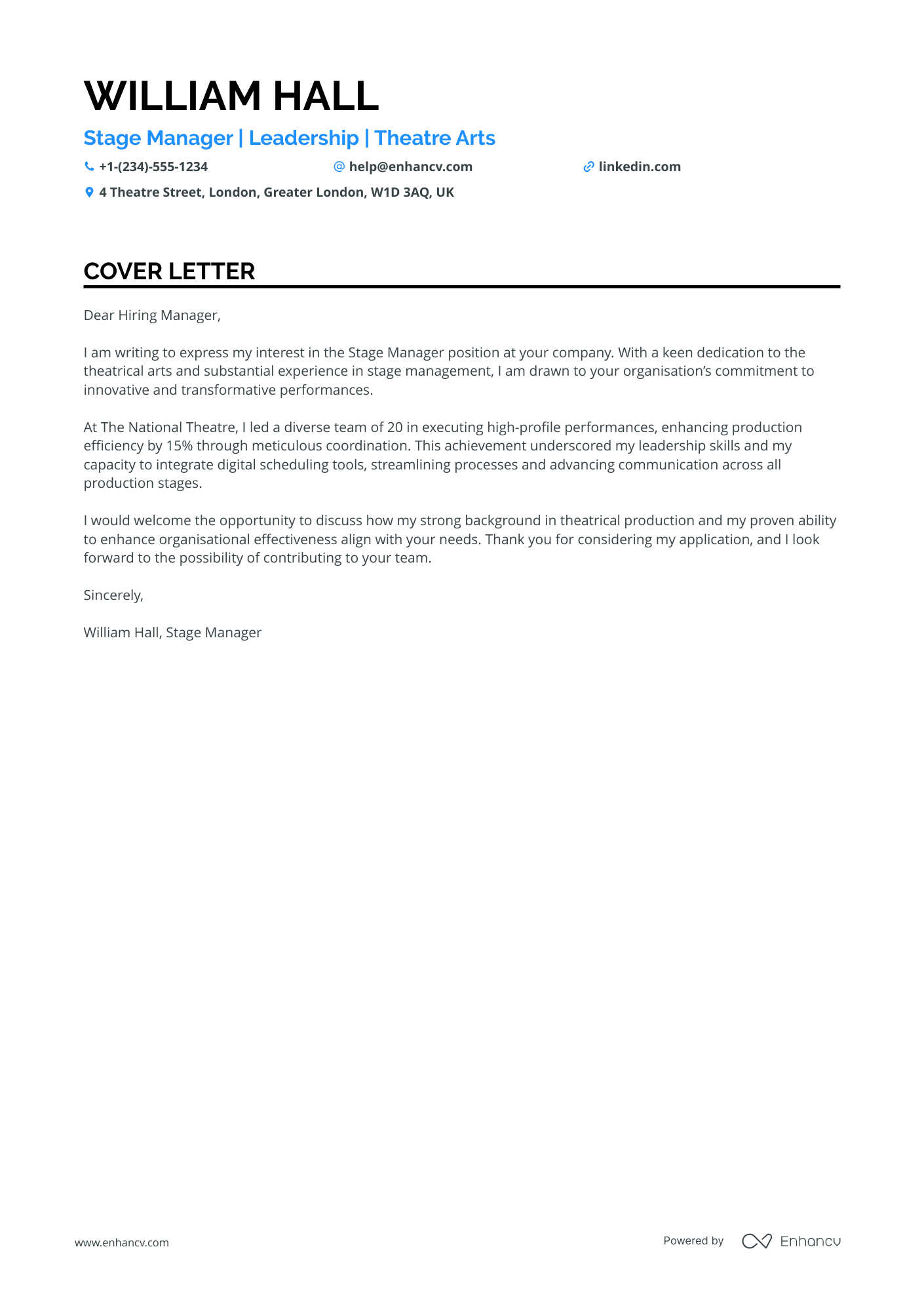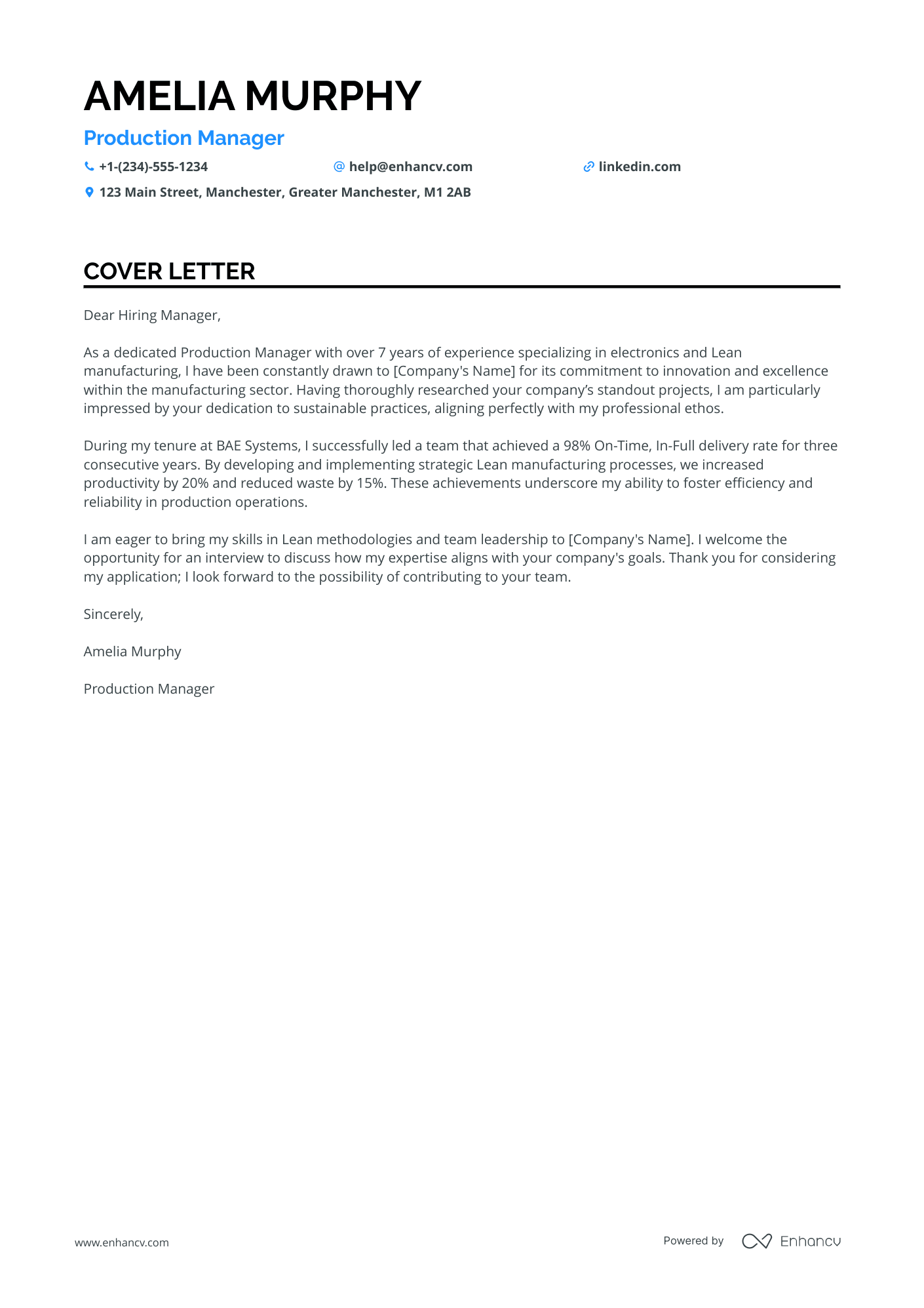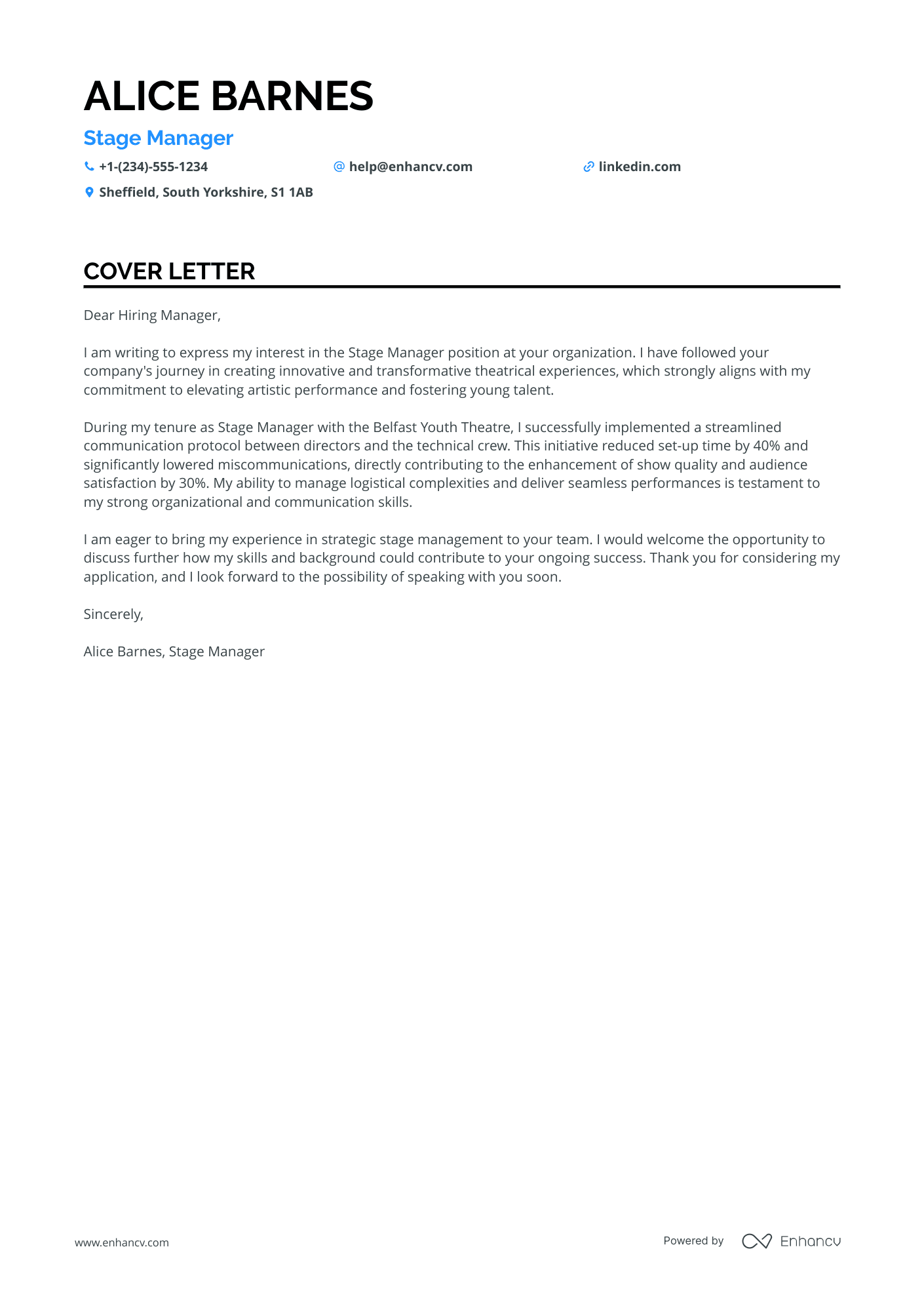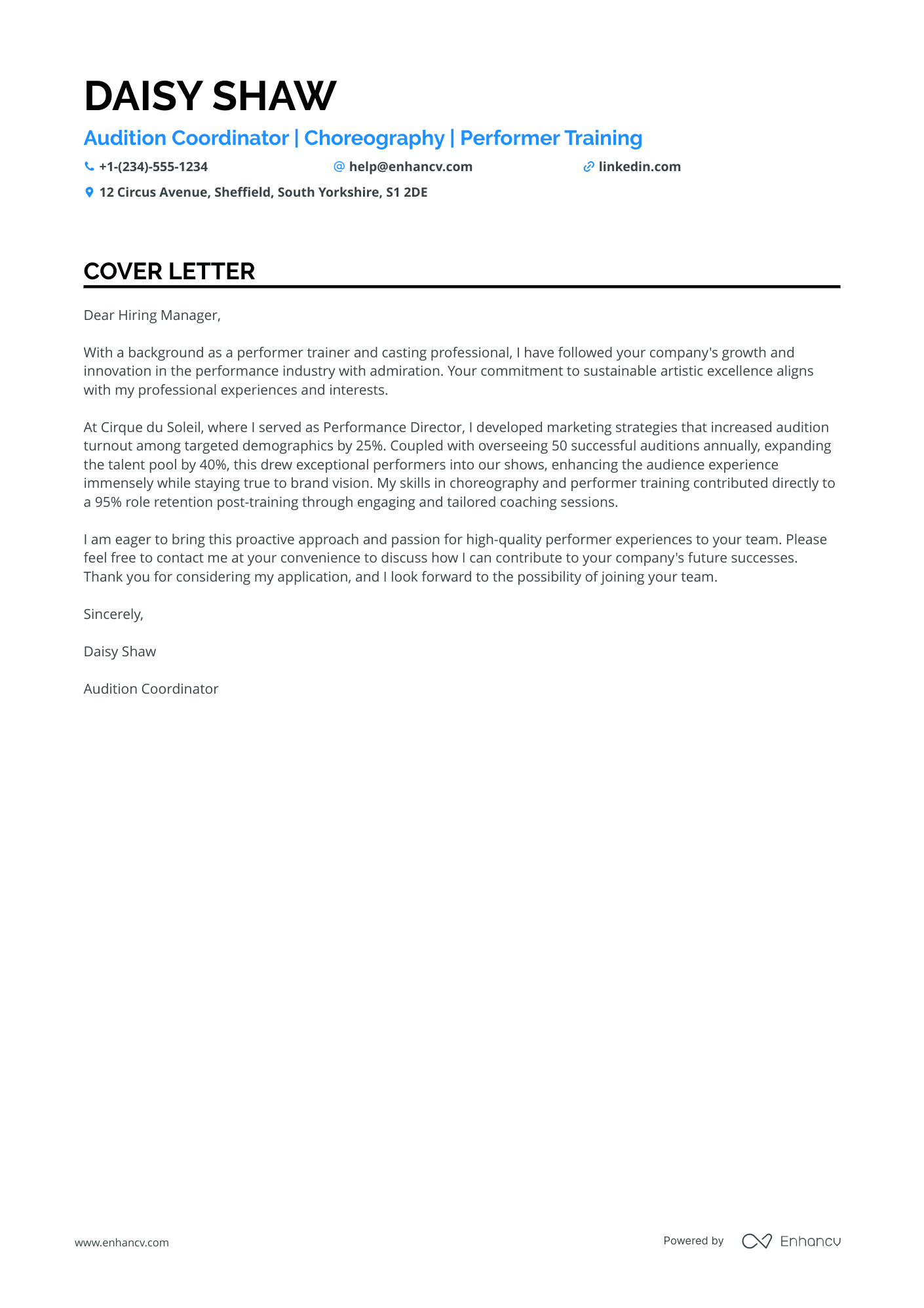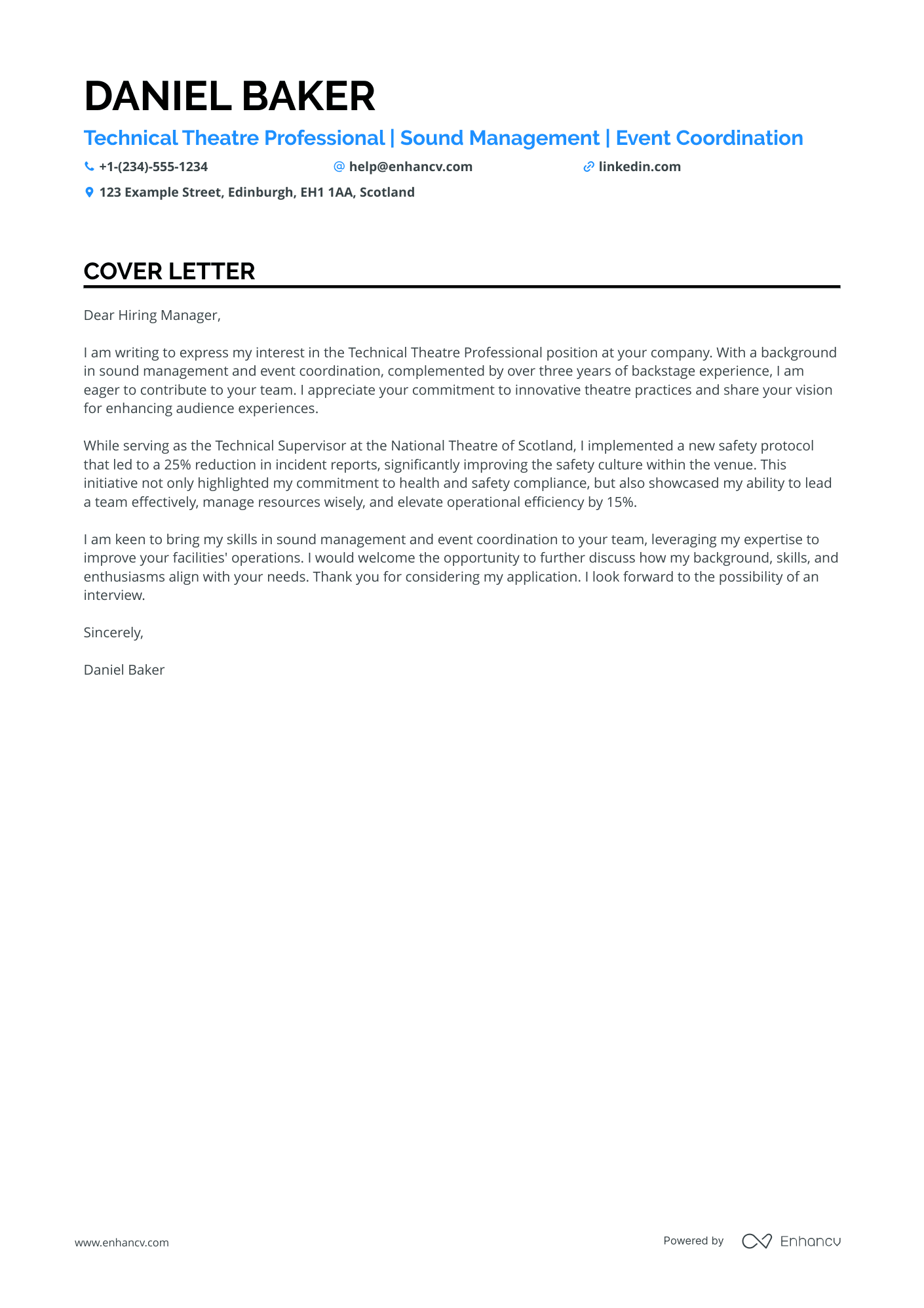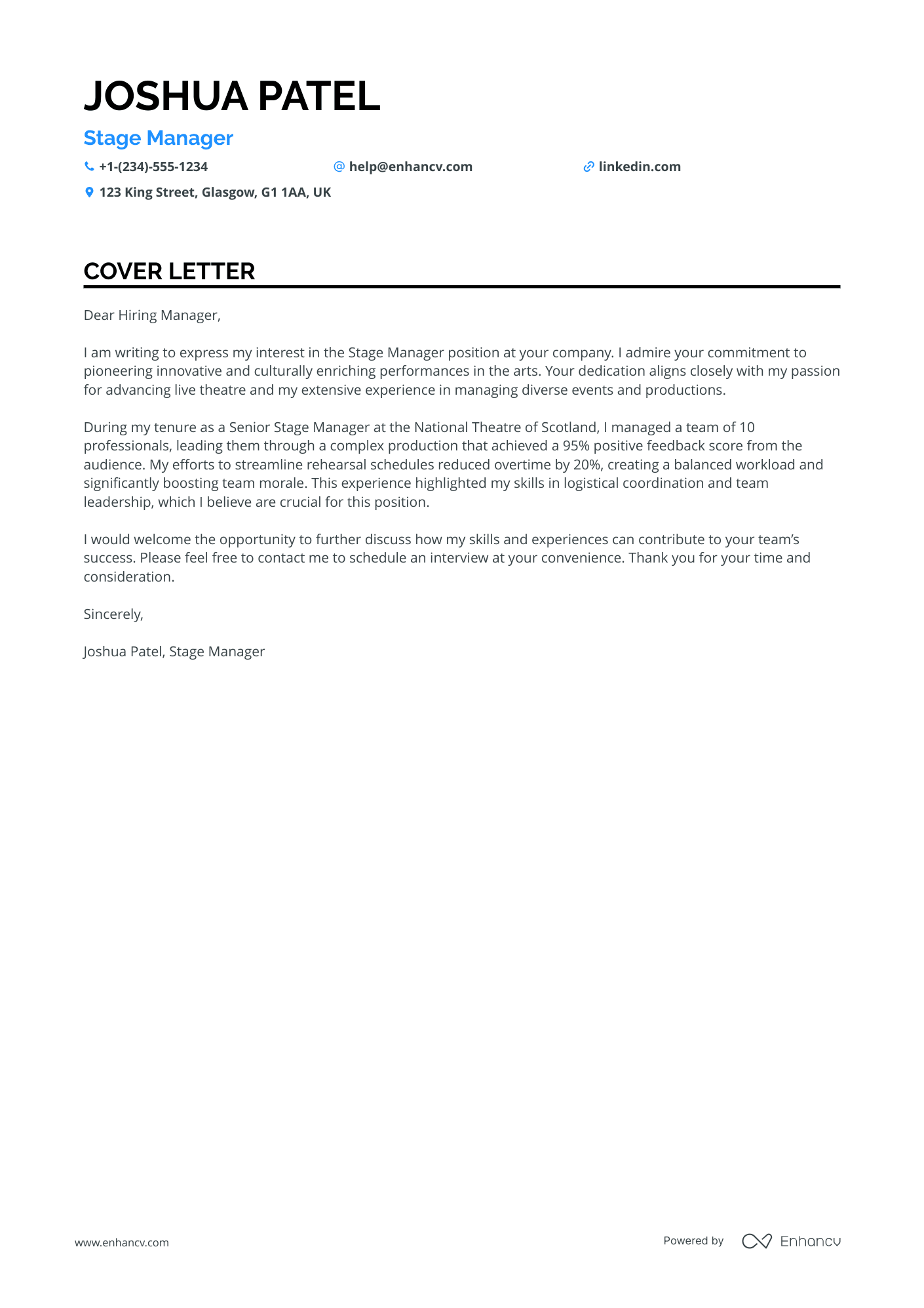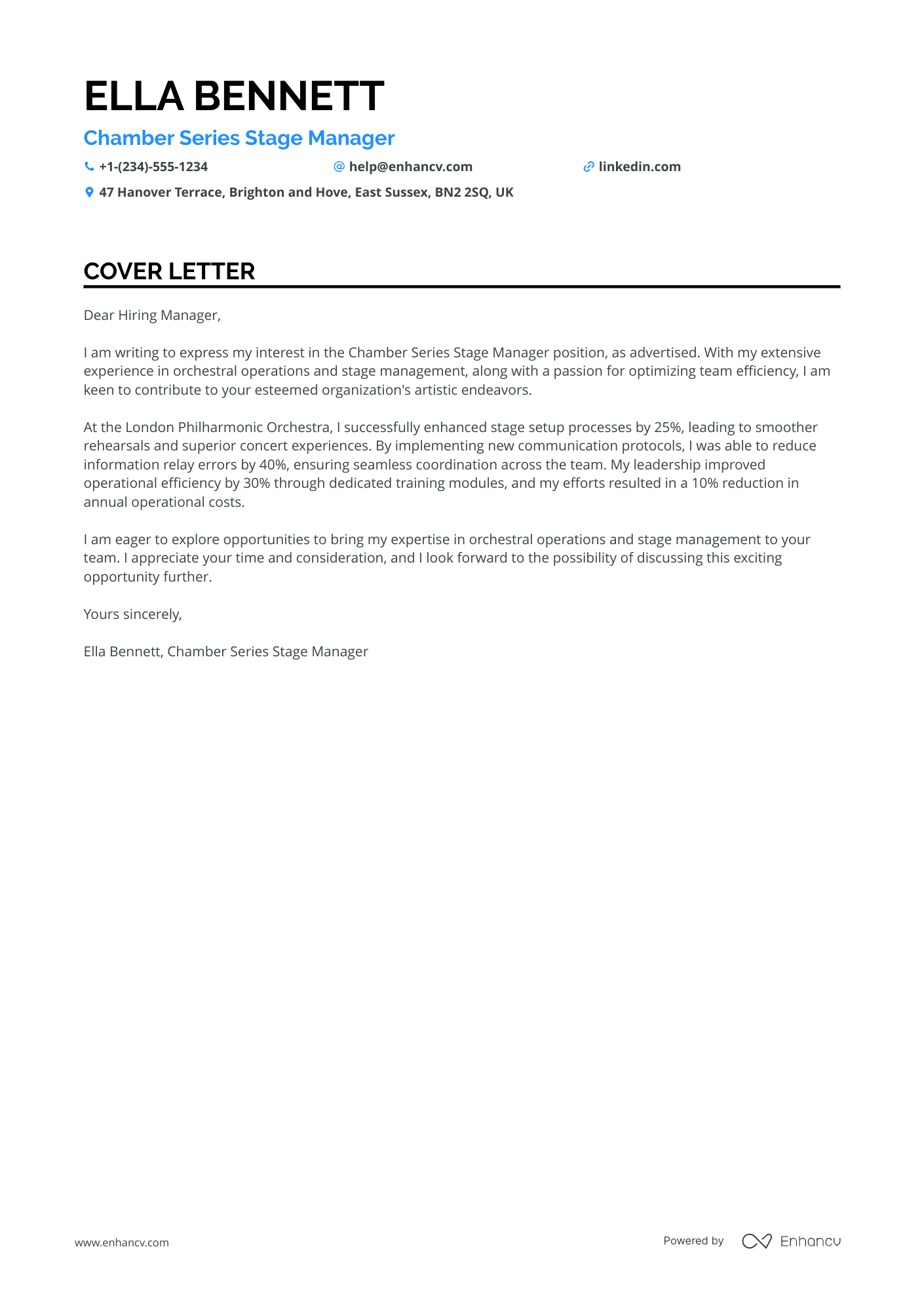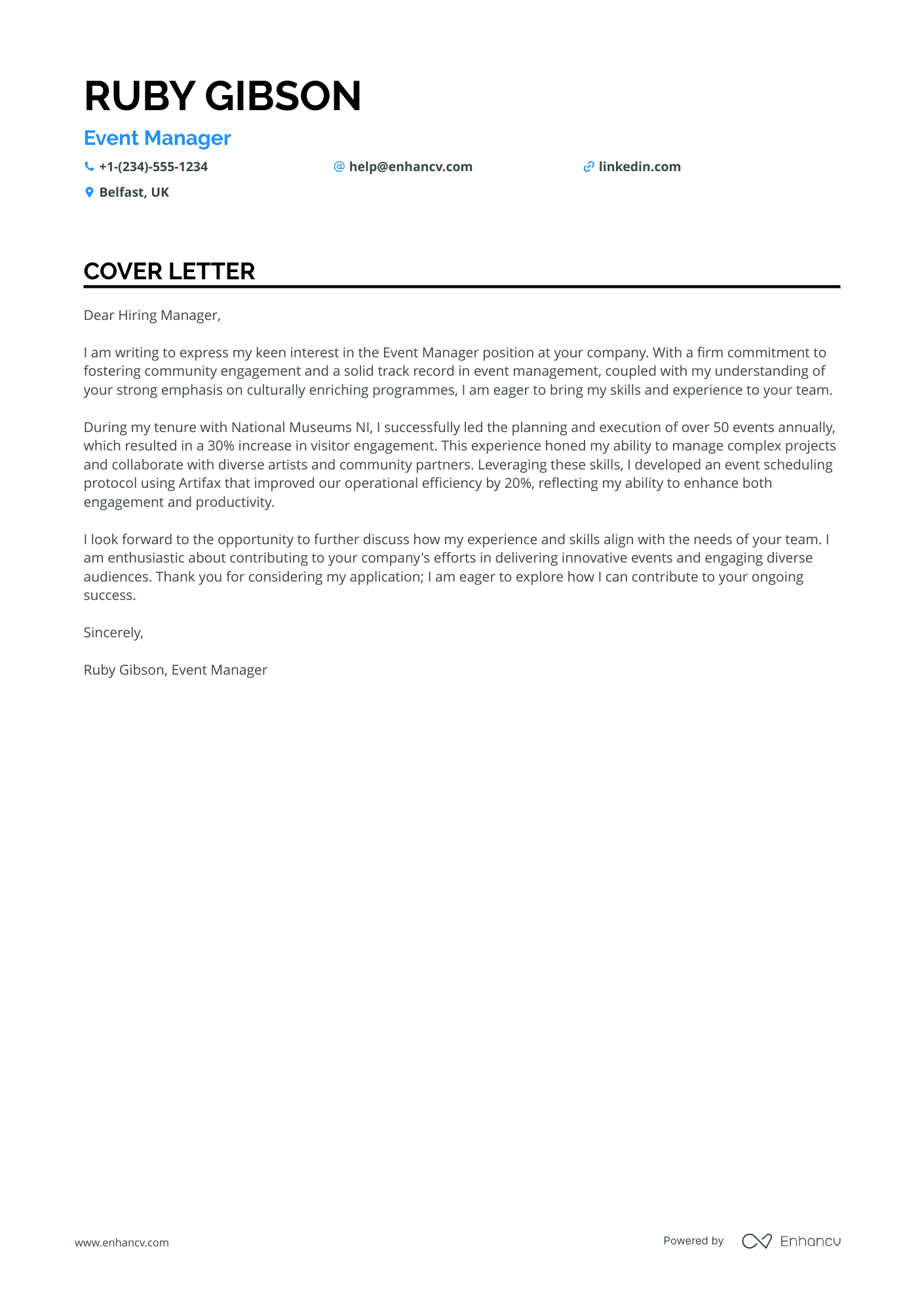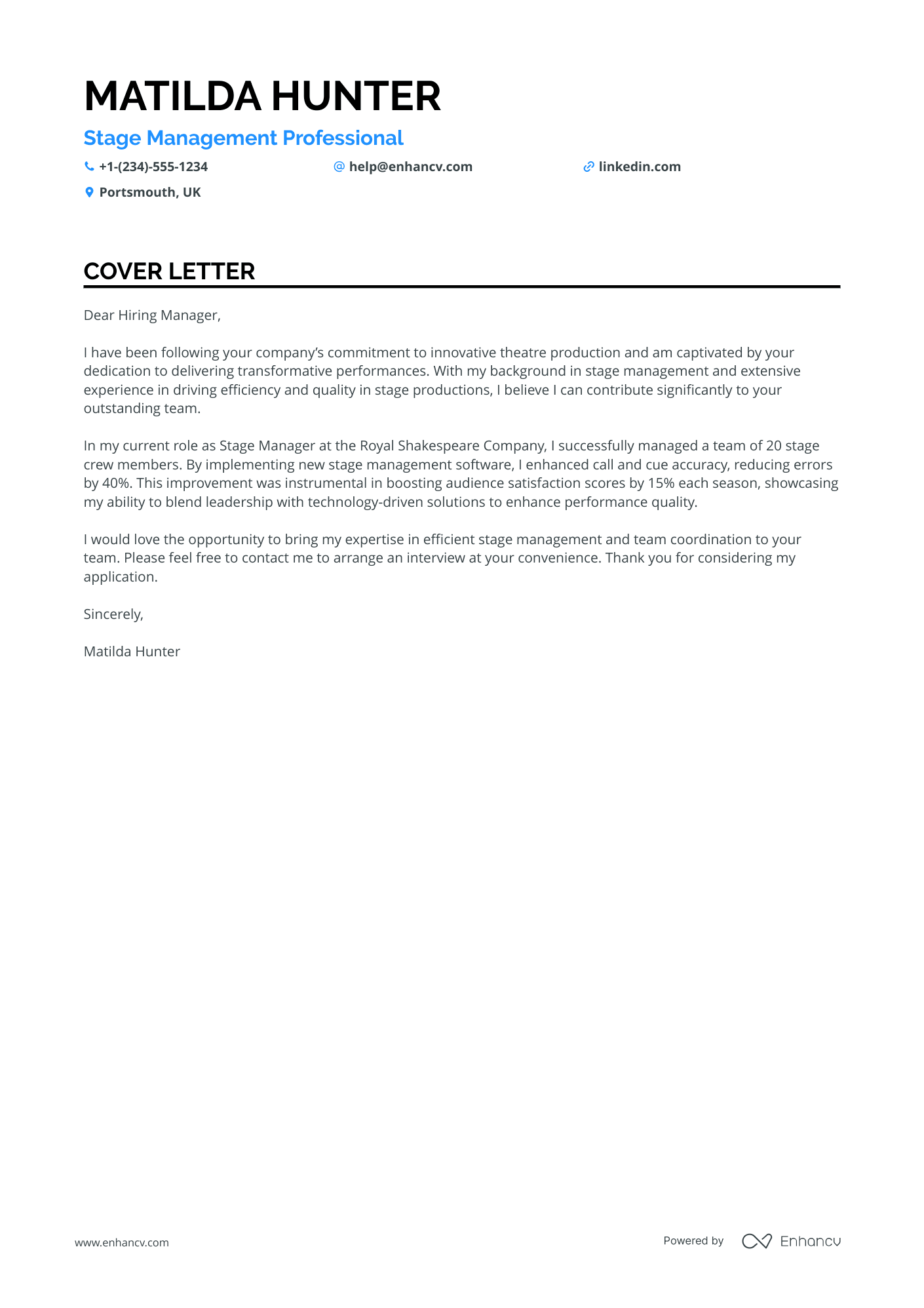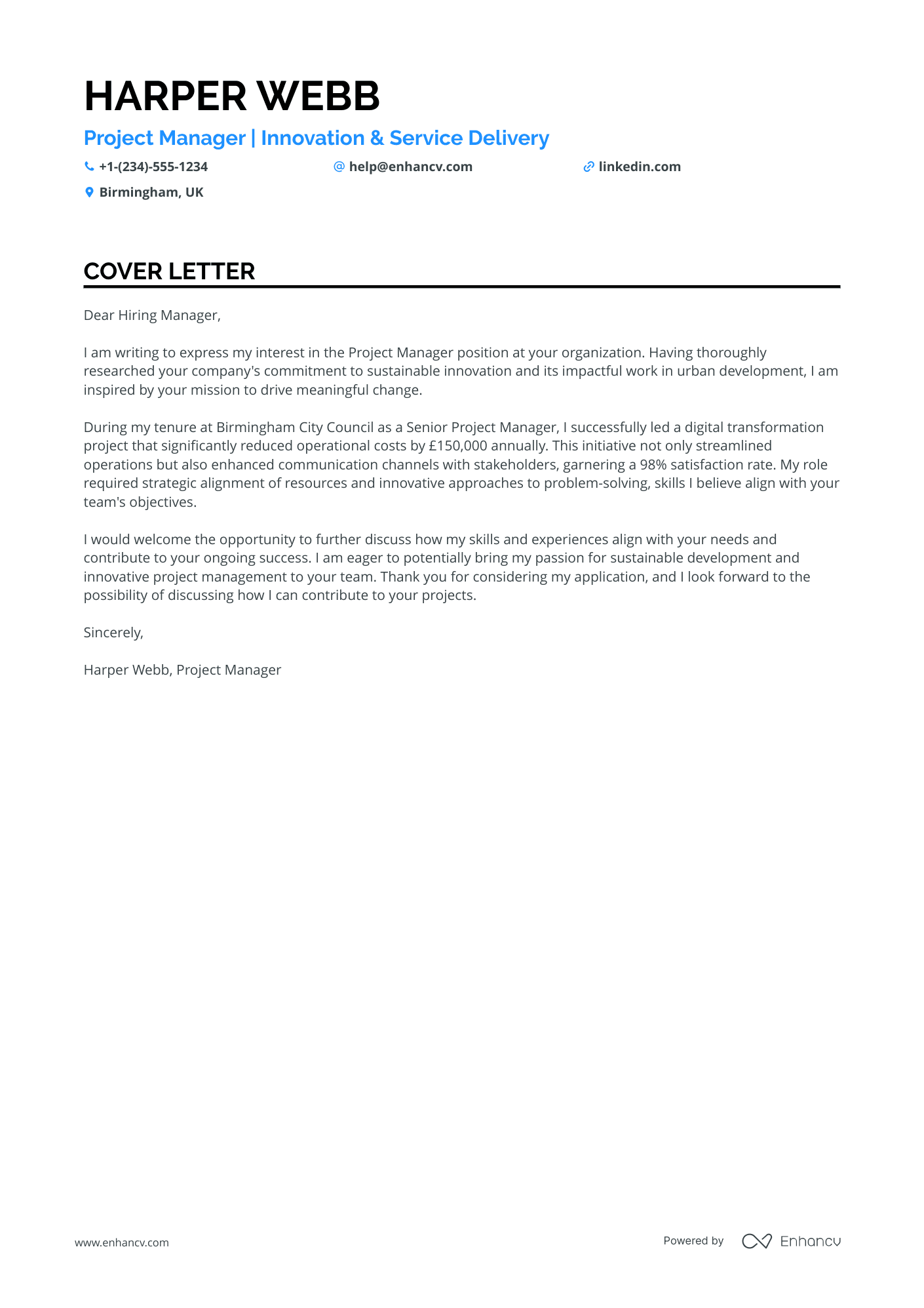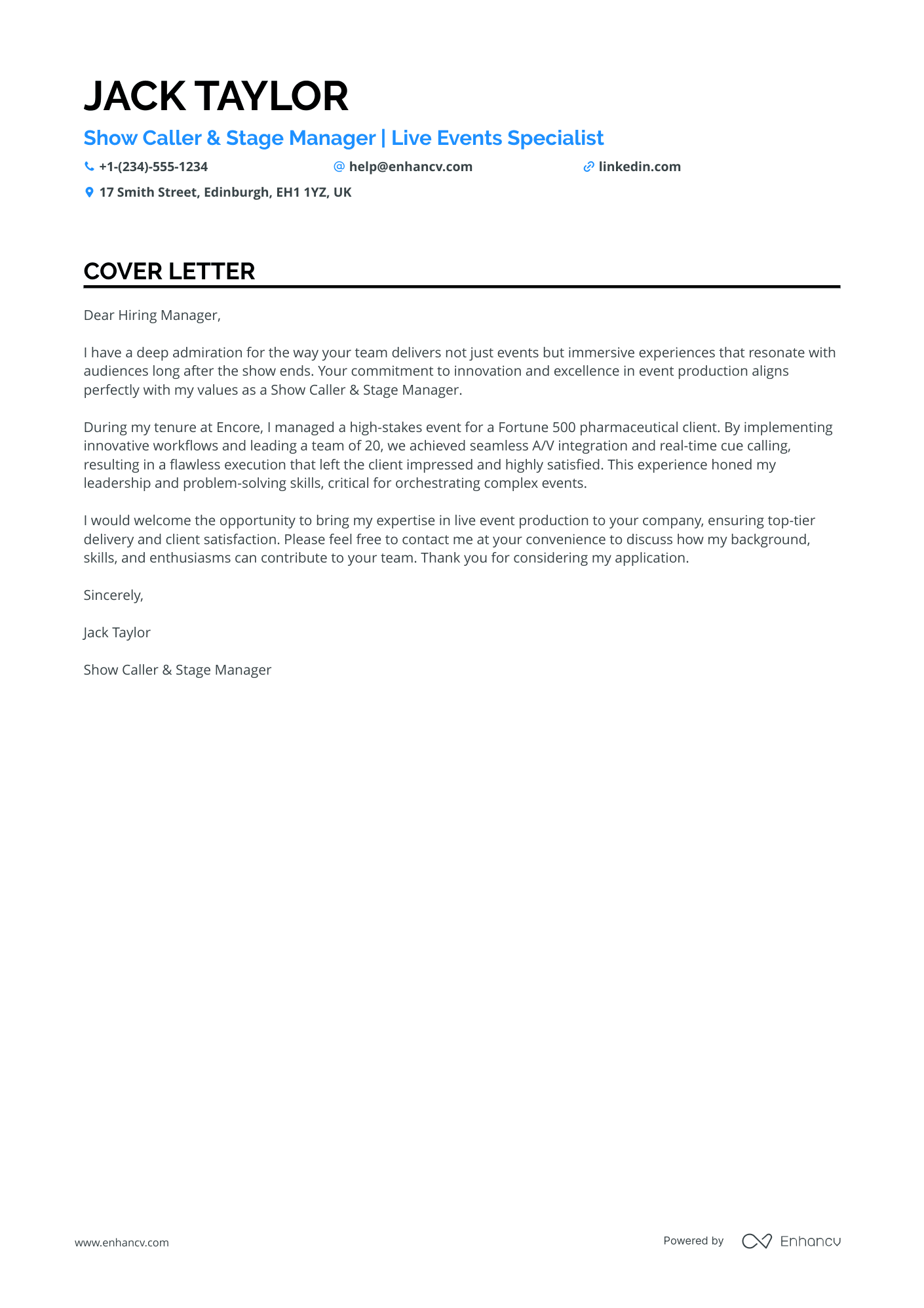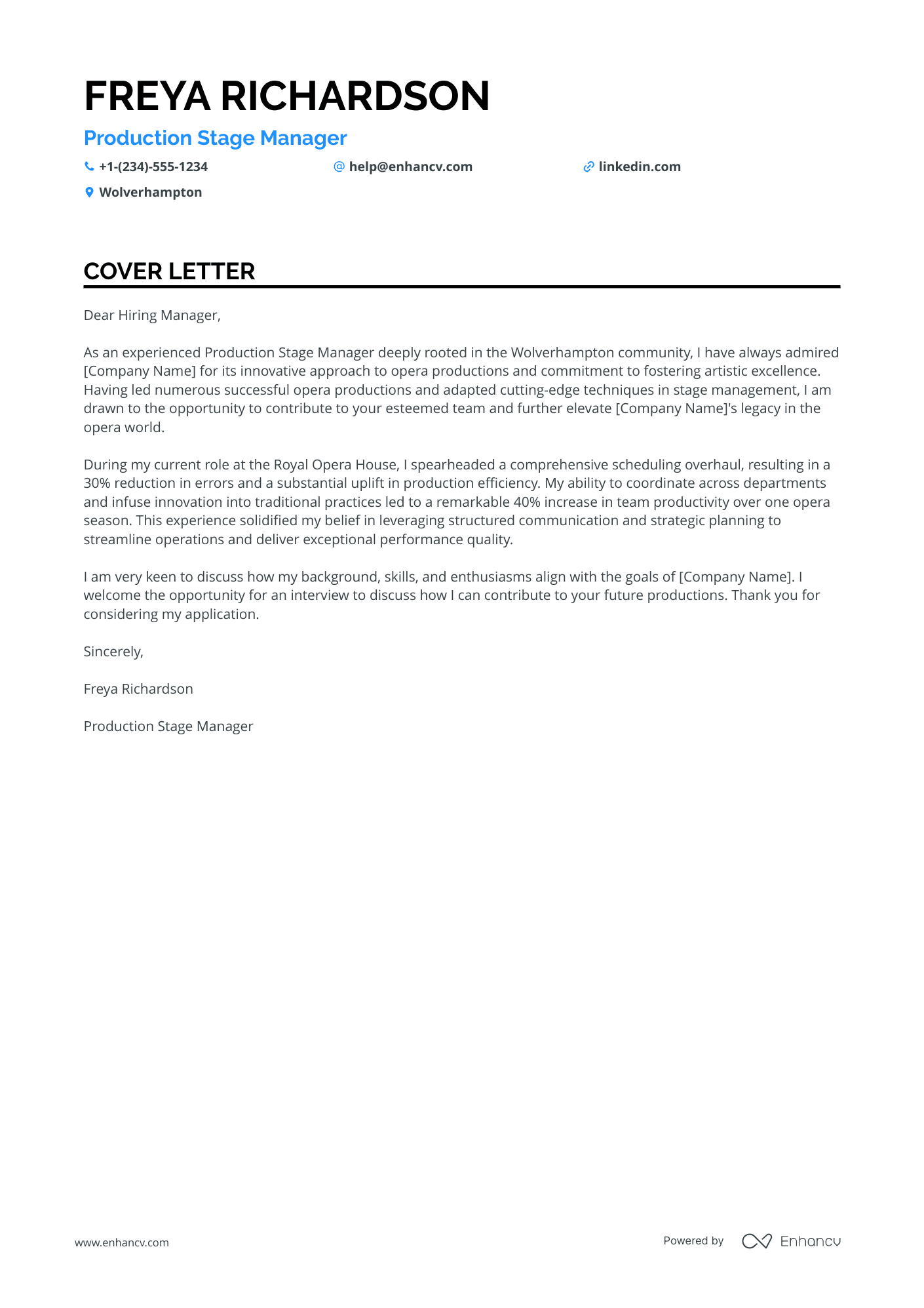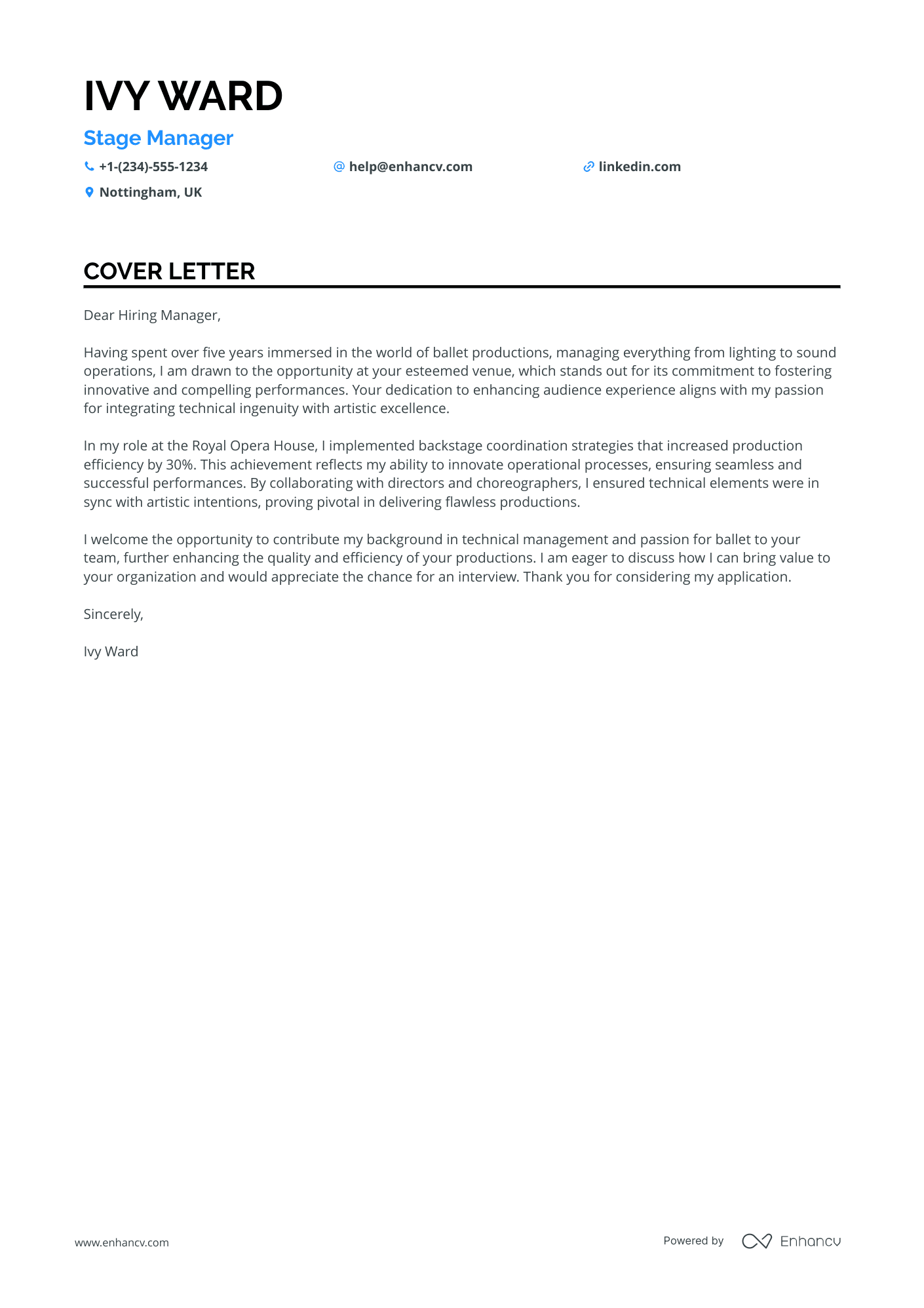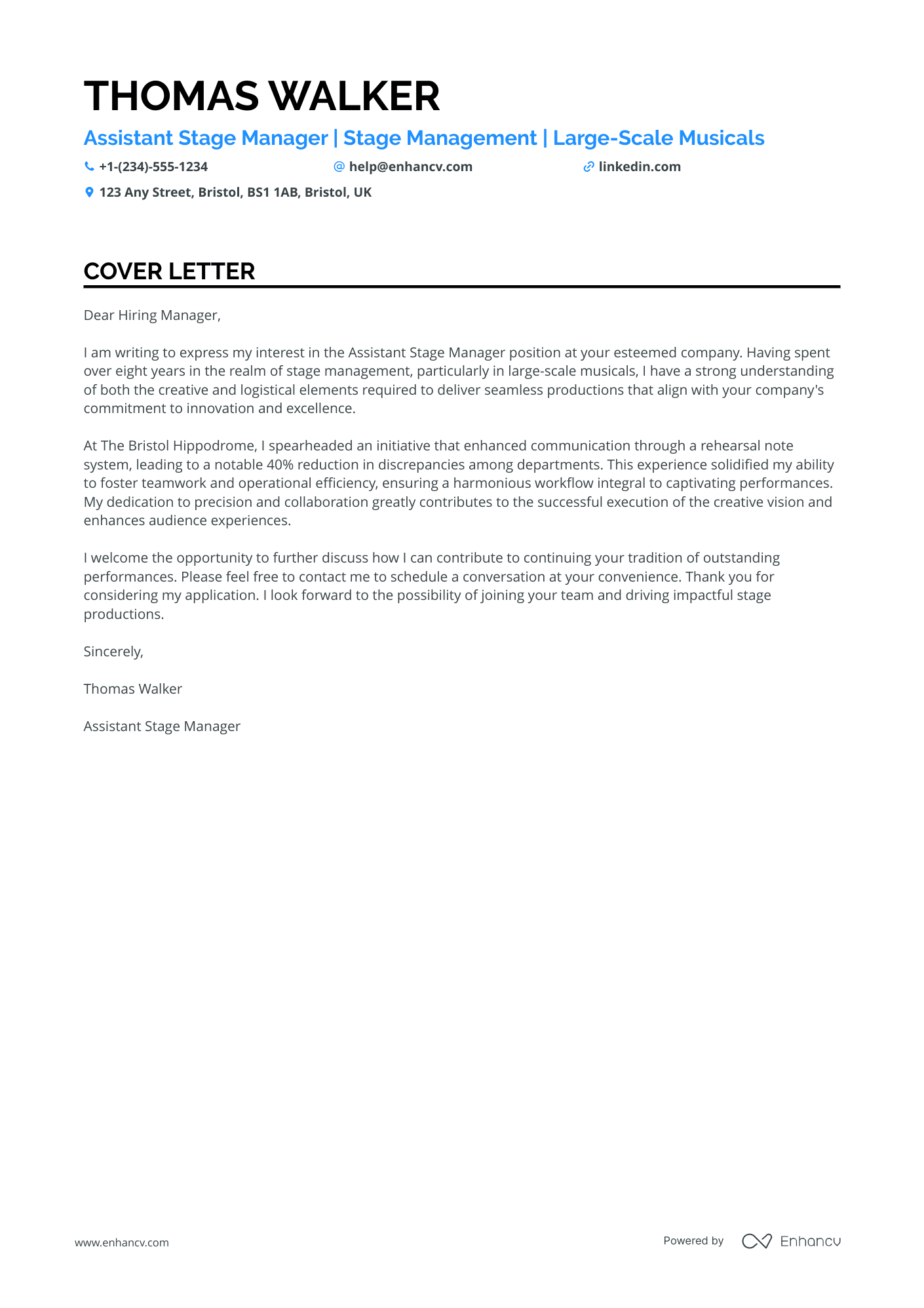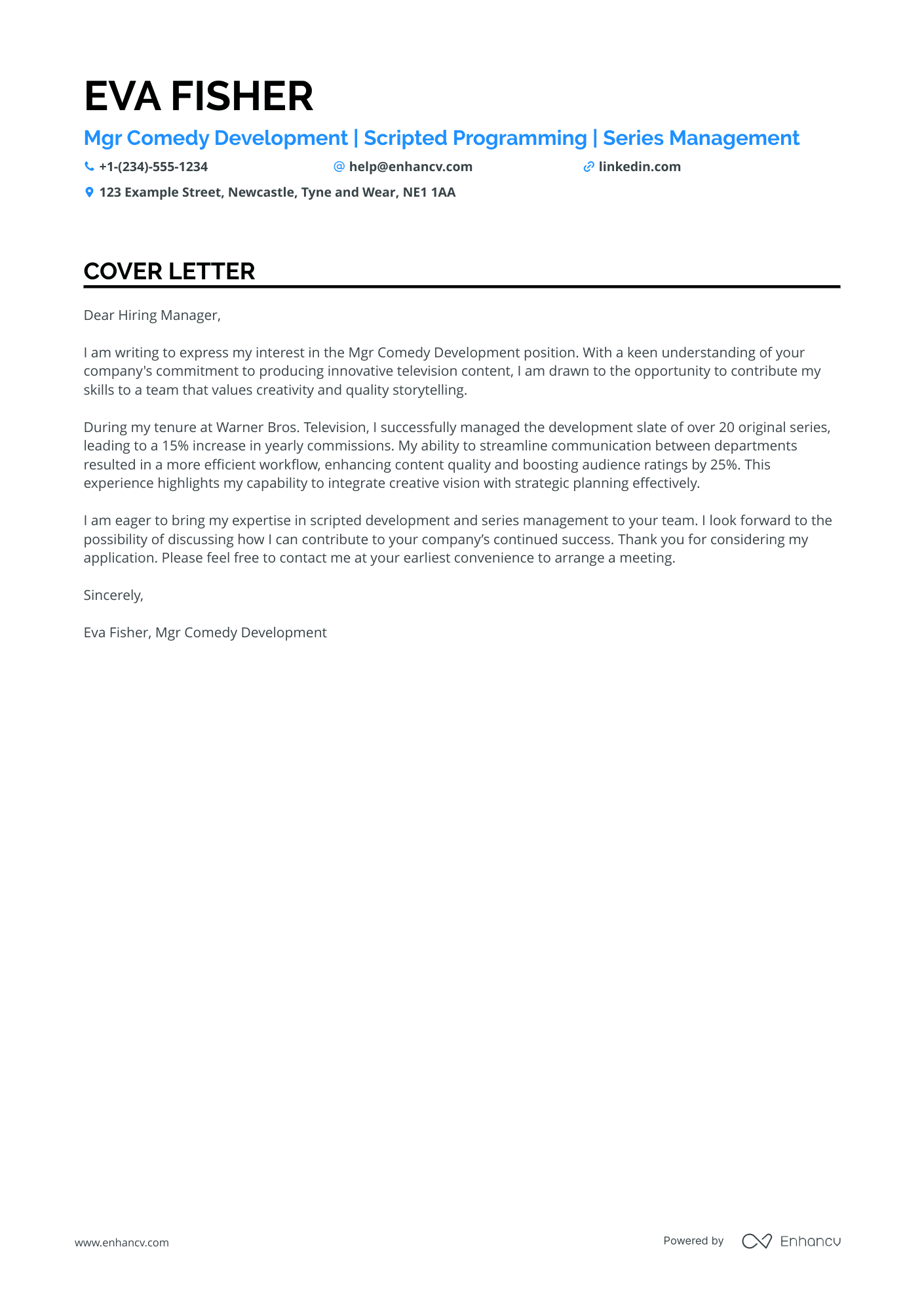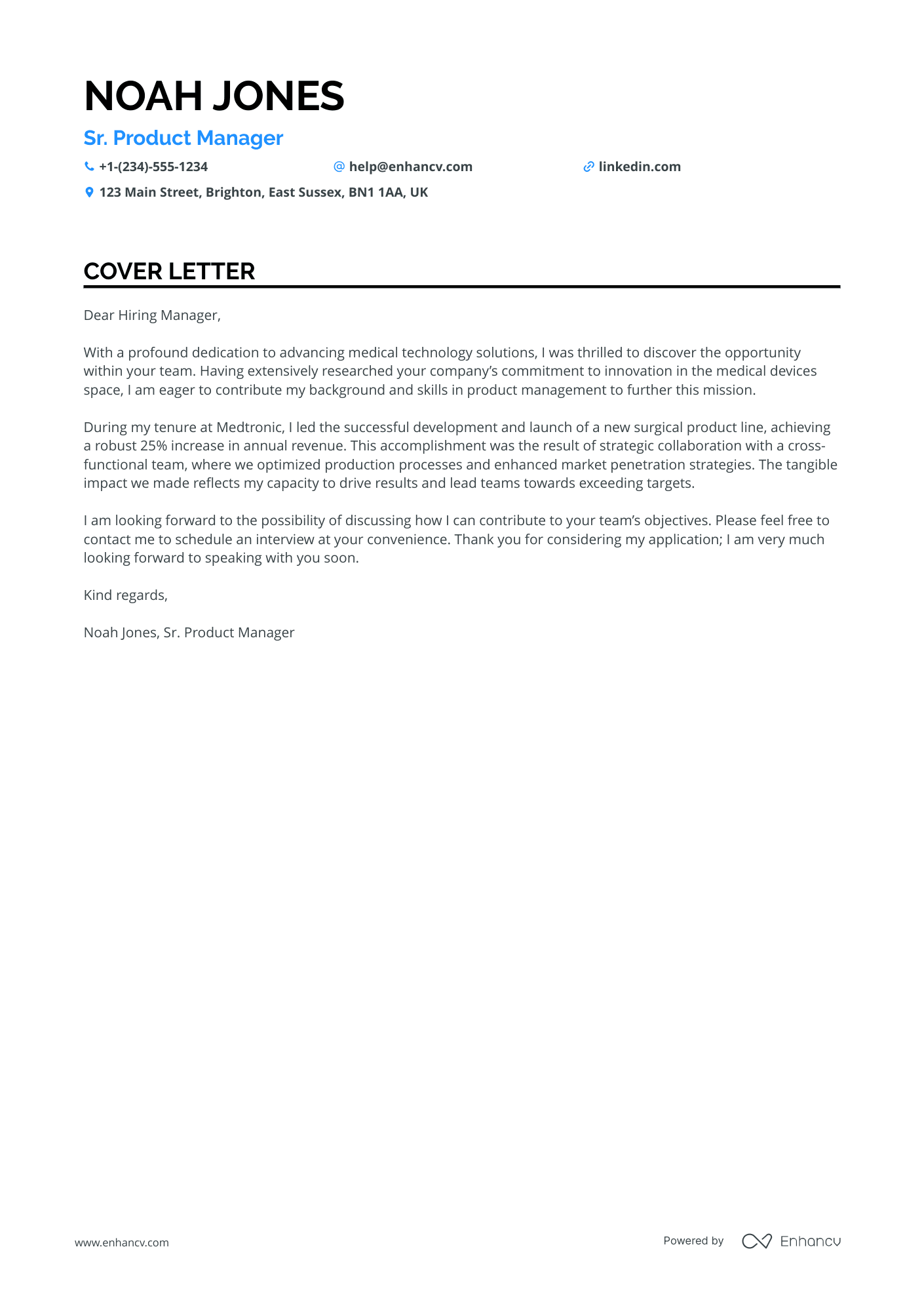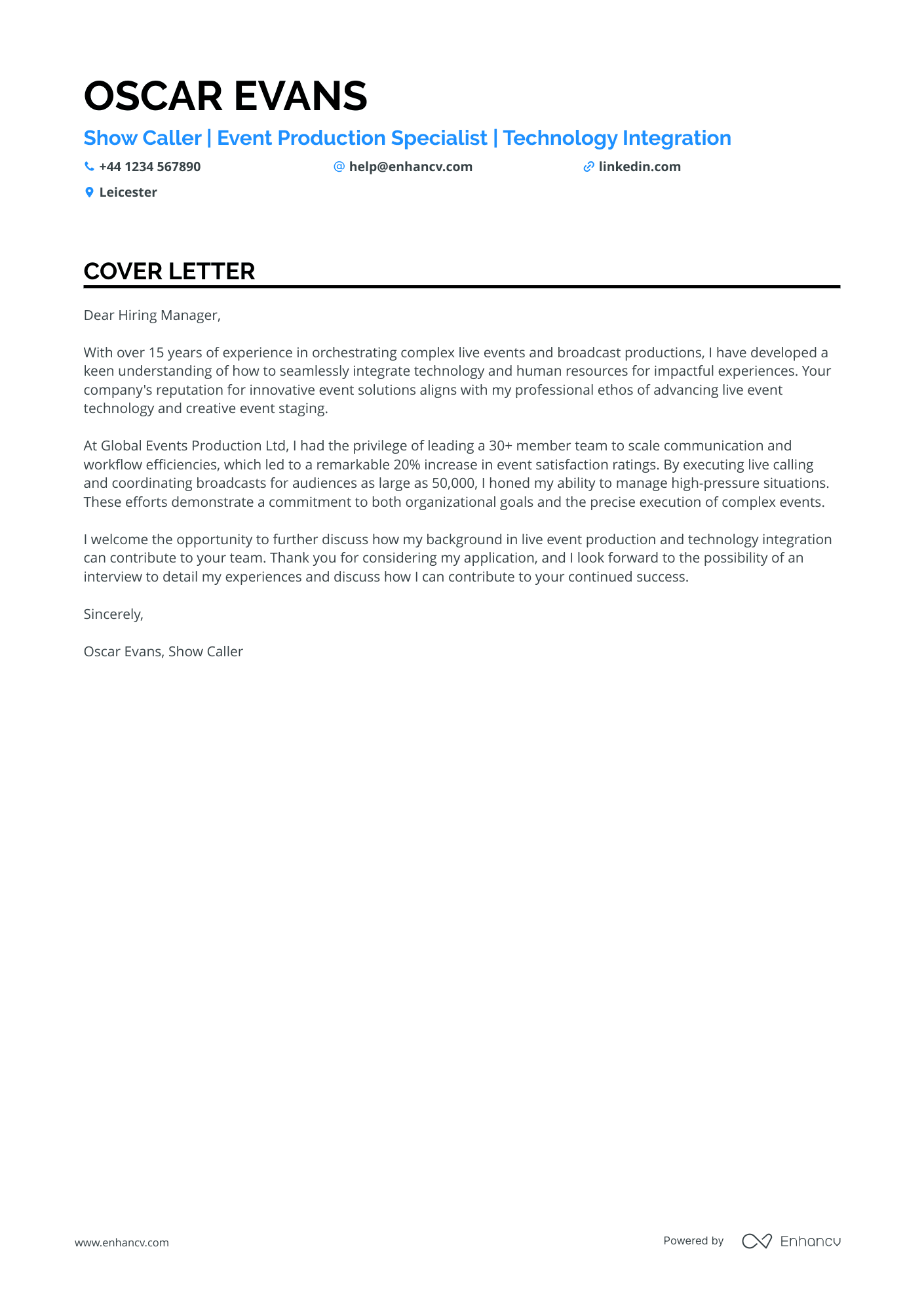Congratulations on completing your first cover letter. However, as you look back, you realise it’s simply a copy-paste of your CV.
Repeating your curriculum vitae is a common pitfall that many candidates encounter, making the cover letter redundant.
Your cover letter should provide fresh insights, adding more value to your application. It’s also the ideal space to address career gaps or major transitions that might not be covered in your CV.
In this guide, you’ll learn how to use your cover letter to demonstrate why you’re the best candidate for the role, while confidently addressing your career history and key achievements.
Cover letter examples for stage manager
By Experience
Senior Stage Manager
- Highlight Relevant Certifications: Emphasising the "Certified Event Management Professional" certification reinforces expertise in event planning and management, which is crucial for an Event Operations Coordinator.
- Emphasise Technical Skills: The cover letter effectively highlights technical supervision and sound mixing skills, which are essential for ensuring high-quality event experiences.
- Showcase Leadership and Team Management: Demonstrating experience in leading teams and improving efficiency, as well as training and overseeing staff, is vital for roles that require coordination of team efforts.
- Focus on Quantifiable Achievements: Providing specific metrics, such as a 20% increase in satisfaction or a 40% improvement in tracking efficiency, makes claims of success concrete and credible.
Junior Stage Manager
- Industry-Relevant Experience: The cover letter effectively highlights Eva's three years of theatre arts experience, underlining skills in lighting, set design, and backstage management, which are crucial for the role of Assistant Director.
- Quantifiable Achievements: The letter includes concrete achievements, such as enhancing audience satisfaction by 30%, which demonstrates Eva's impact and capability in the role.
- Relevant Certifications and Courses: The inclusion of an Advanced Stage Management course and a Lighting Design Certification from reputable institutions adds authority and demonstrates specialised knowledge pertinent to the theatre arts domain.
- Passion for Theatre Innovation: Eva's passion for exploring new methods and technologies aligns well with the innovative nature of an Assistant Director role, showing a proactive approach to enhancing audience experience.
Professional Stage Manager
- Highlighting a measurable impact, such as reducing resource allocation conflicts by 25% and improving project delivery speed, showcases the candidate's ability to drive efficiency, which is crucial for a Resourcing Manager role.
- Showcasing relevant certifications like the "Resource Management Professional" certification emphasises the candidate's specialised knowledge in effective resource allocation, reinforcing their expertise.
- The inclusion of advanced skills in software tools like Microsoft Excel, Planview, and Clarity underscores the candidate's technical capabilities, which are essential for data-driven resource management.
- Emphasising achievements like implementing a new resource management software system resulting in a 30% increase in team productivity demonstrates the candidate's initiative and impact within their team, important for leadership roles.
By Role
Assistant Stage Manager
- Relevant Experience: The cover letter highlights over 5 years of experience in stage management, showcasing a deep understanding of opera production collaboration and music interpretation, which is crucial for an assistant stage manager role.
- Proven Skills in Efficient Coordination: Emphasises achievements such as a 20% increase in rehearsal coordination efficiency and error reduction, demonstrating the applicant's ability to effectively manage production processes.
- Specialised Education and Certifications: The applicant has an Associate Degree in Performing Arts and completed advanced courses such as "Advanced Stage Management Techniques," providing a strong educational background applicable to the role.
- Strong Communication and Leadership Skills: Highlights the ability to facilitate communication and lead teams, crucial for ensuring seamless operations during high-pressure performances.
Deputy Stage Manager
- Highlighting Relevant Experience: The cover letter effectively draws attention to the candidate's stage management experience at The National Theatre and the Royal Shakespeare Company, showcasing a track record of leadership and technical proficiency in reputable institutions.
- Quantifiable Achievements: By including measurable outcomes, such as a 15% increase in production efficiency and a 98% performance satisfaction rate, the candidate demonstrates a proven impact in previous roles.
- Emphasising Leadership and Communication Skills: The cover letter details instances of coordinating large teams and facilitating communication between artistic and technical staff, essential skills for a stage manager ensuring smooth production execution.
- Showcasing Problem-Solving Abilities: The cover letter describes instances of emergency response and real-time problem solving during live shows, highlighting the candidate's capability to maintain performance quality under pressure.
Stage Production Manager
- Emphasising Relevant Experience: The cover letter highlights Amelia's extensive experience as a Production Manager in the manufacturing industry, specifically in electronics and Lean manufacturing, which is crucial for establishing her expertise and reliability in the field.
- Showcasing Quantifiable Achievements: The letter effectively uses specific statistics and outcomes, such as achieving a 98% On-Time, In-Full delivery rate, a 20% productivity increase, and a 15% waste reduction, to demonstrate Amelia's impact and success in previous roles.
- Highlighting Key Skills and Certifications: Key skills and certifications such as Lean Manufacturing, Six Sigma, and Lean Six Sigma Green Belt Certification are prominently featured, which align directly with the expectations and requirements for a production management role.
- Detailing Leadership and Team Development: Amelia outlines her leadership capabilities, including mentoring and coaching team members into senior roles, showcasing her ability to drive team performance and career advancement.
Theatre Stage Manager
- Detailed Experience: The cover letter offers specific experiences from various theatre roles, emphasising skills in managing technical aspects and logistics, essential for a Stage Manager role.
- Highlighting Achievements: By outlining achievements such as audience satisfaction improvement by 30%, and setting up new communication protocols, it showcases the impact of their contributions.
- Relevant Education and Courses: The applicant holds a Master’s degree in Theatre and Performance and has taken specialised courses such as Advanced Stage Management, supporting their expertise in the field.
- Passion for Youth Theatre: Demonstrating a passion for nurturing young performers aligns with the nature of stage management in a youth theatre, showing a deeper commitment to the role beyond technical skills.
Touring Stage Manager
- Relevant Experience: Demonstrating ample experience in audition coordination and performer training across high-profile companies such as Cirque du Soleil and Disney Theatrical Productions, indicating a well-rounded industry expertise.
- Significant Achievements: Highlighting major accomplishments like expanding talent acquisition markets and prestigious choreography recognition, which showcase ability to bring tangible enhancements to the role.
- Technical Skills: Emphasizing proficiency in Microsoft Office and video editing adds value by illustrating capability to manage technical aspects of production processes efficiently.
- Specialized Training: Inclusion of relevant courses such as Advanced Circus Arts Coaching underscores a commitment to continuous professional development tailored to industry-specific needs.
Technical Stage Manager
- Role-specific Experience: The candidate highlights over 3 years of backstage experience, which is crucial for a Technical Theatre Professional. Such specific experience assures potential employers of their competency in similar roles.
- Achievements in Operational Efficiency: By quantifying achievements, such as a 20% increase in efficiency and a 25% reduction in incident reports, the candidate effectively demonstrates their capability to deliver tangible improvements in operational workflows and safety protocols.
- Relevance of Education and Certifications: The candidate mentions advanced education in fields directly related to the job, such as a Master of Fine Arts in Technical Theatre and certifications like "Advanced Sound Engineering" and "Rigging and Working at Heights," underlining their specialised skill set.
- Emphasis on Cross-disciplinary Skills: Highlighting skills in areas like Health and Safety Compliance and EQMS showcases the candidate's ability to integrate and manage various aspects of theatre operations, a valuable trait when coordinating complex events.
Freelance Stage Manager
- Emphasising leadership skills by highlighting experiences in managing teams and achieving high audience satisfaction is beneficial for a Stage Manager role where coordination and team dynamics are crucial.
- Detailing specific technical and logistical successes, such as streamlining rehearsal schedules and overseeing inventory, showcases the ability to enhance efficiency and reduce costs, which are valuable skills in stage management.
- Highlighting success in health and safety management, with zero incidents across multiple venues, reflects a strong commitment to maintaining safe work environments, an essential aspect of managing live events and performances.
- Including achievements related to enhancing communication and reducing turnover times between productions demonstrates proficiency in maintaining smooth operations and optimising processes, an important aspect in fast-paced and dynamic environments.
By Industry
Concert Stage Manager
- Highlighting specialised training in orchestral stage management (e.g., "Orchestral Stage Management Essentials" course) to show domain expertise.
- Emphasising achievements in efficiency and communication problem-solving, such as improving stage setup processes by 25% and implementing new communication protocols, thereby demonstrating impactful contributions.
- Showcasing leadership experience and team dynamics capabilities, particularly in managing and training stage crews, ensuring effective team interaction and performance management.
- Mentioning fluency in languages relevant to the role, like English and French, can be beneficial for working in diverse cultural environments within orchestral settings.
Event Stage Manager
- Detailed Professional Experience: Highlighting specific achievements such as increasing audience engagement by 30% demonstrates quantifiable success in previous roles, which is crucial for an event management position.
- Relevant Skills and Tools: Mentioning tools like Artifax and skills in stakeholder engagement and budget management is particularly relevant, as these capabilities are necessary to manage complex events effectively.
- Education and Courses: Including advanced and relevant certifications such as "Advanced Event Budget Management" signifies continuous professional development specific to the field of event management.
- Emphasis on Community Engagement: Showcasing a passion for local community development and a track record of enhancing community participation aligns with the role's focus on community engagement.
Festival Stage Manager
- Relevant Experience: The cover letter effectively highlights Matilda's extensive experience in stage and company management with prestigious organisations like the Royal Shakespeare Company and the National Theatre, showcasing her qualifications for a leadership role in stage management.
- Quantifiable Achievements: It provides specific, quantifiable achievements, such as improving efficiency by 30% and increasing ticket sales by 25%, offering concrete evidence of her impact and success in previous roles.
- Skill Emphasis: The letter underscores crucial skills such as budget management, team mentoring, and workflow process improvement, aligning with the essential skills required for an advanced stage management position.
- Education and Training Credentials: Matilda's academic background, including a Master's in Stage Management and additional courses in advanced techniques, is prominently mentioned, solidifying her expertise and dedication to professional development in theatre production.
Performance Stage Manager
- This cover letter effectively highlights Harper Webb's advanced project management skills, underlining achievements such as delivering projects with a 95% success rate and reducing project costs by £180k, aligning with the goals of a Project Manager role.
- The inclusion of professional certifications, such as the Prince2 Practitioner Certification and Agile Certified Practitioner (PMI-ACP), demonstrates Harper Webb's commitment to continuous learning and advanced techniques, which are crucial for specialised roles in project management.
- Harper Webb's passion for Sustainable Urban Development is prominently featured and is particularly relevant to the mentioned achievements in reducing CO2 emissions and enhancing local engagement, showcasing a strong alignment with sustainable goals within the project delivery field.
- Emphasising the experience with digital transformation and technology innovations can be especially valuable in a project management role focused on modernising processes and integrating new technologies for enhanced operational efficiency.
Live Show Stage Manager
- Relevant Experience: Emphasise experience in show calling and stage management roles, supported by specific achievements such as managing Fortune 500 client events and coordinating large-scale trade shows.
- Specialised Skills: Highlight capabilities in A/V integration, broadcast technology, and technical direction, which are crucial for successfully managing live events.
- Education and Certifications: Mention advanced degrees and courses related to event management, showcasing a strong foundation in theoretical and practical aspects of live event production.
- Leadership and Problem-Solving: Illustrate examples of leading large teams and resolving unexpected technical issues, demonstrating the ability to maintain control and professionalism under pressure.
Opera Stage Manager
- Industry-Specific Experience: The cover letter effectively highlights the candidate's significant experience within the specialised field of opera production across renowned companies, which can boost credibility and appeal to potential employers within the industry.
- Quantifiable Achievements: Emphasis on measurable achievements such as reducing errors and downtime, improving efficiency, and increasing team productivity by significant percentages demonstrates a result-oriented approach, which is valuable for competitive roles such as stage production management.
- Advanced Education and Training: Highlighting advanced education in Theatre and Performance Studies, along with specialised courses such as Advanced Stage Management, positions the candidate as highly qualified for complex roles in stage management, showcasing continuously refined skills.
- Key Skills and Passion: Efficiently blends key skills like clear communication, time management, and problem-solving with a deep passion for opera, making the candidate suitable for a role that demands both technical expertise and a genuine interest in opera production.
Ballet Stage Manager
- Highlighting Relevant Experience: The cover letter effectively emphasises the candidate's extensive experience in managing lighting and sound operations for ballet productions, which is crucial for a Stage Manager role in ballet.
- Showcasing Achievements: By detailing a 30% increase in production efficiency through innovative backstage coordination, the candidate demonstrates their ability to enhance performance operations and leadership skills.
- Education and Certifications: The inclusion of a Master of Fine Arts in Theatre Production and specific courses such as "Advanced Lighting for Dance Productions" underscores the candidate's formal training and specialisation, essential for technical roles in theatre.
- Skills and Technical Proficiency: Listing skills such as 'Lighting Board Operation' and 'Sound Board Operation' alongside a record of 'zero safety incidents' showcases both technical expertise and a commitment to performance safety, which are critical for the Stage Manager role.
Film Stage Manager
- Emphasising experience with large-scale musicals showcases the candidate's ability to manage complex, high-stakes productions efficiently, reinforcing their eligibility for roles requiring extensive coordination and stage management.
- Highlighting participation in advanced courses and specific achievements in technology implementation reflects a commitment to professional growth and adaptability to modern stage management practices, which is crucial for staying relevant and effective in the field.
- Noting high audience satisfaction ratings and successful preservation of creative vision emphasises the candidate’s dedication to quality and their ability to contribute positively to the audience's theatrical experience.
- Including leadership in training and team coordination highlights strong interpersonal skills and the ability to foster productive team environments, which are essential for managing the dynamic challenges of stage productions.
Television Stage Manager
- Highlighting proven track record in increasing show success rate and production efficiency, showcasing tangible impact in the scripted development field.
- Emphasising cross-departmental communication skills and leadership in managing creative processes, crucial for roles in series management and development.
- Showcasing education and specialised training in Creative Writing and Script Analysis, reinforcing expertise relevant to Scripted Programming roles.
- Demonstrating passion for storytelling and cultural engagement, aligning personal interests with professional objectives in the entertainment industry.
Radio Stage Manager
- Highlight relevant certifications such as the Advanced Product Management Certification, which emphasises strategic thinking and innovation in product management, aligning with the role's focus on new product developments.
- Emphasise experience in leading cross-functional teams and optimising production processes, as showcased in previous roles, highlighting skills in enhancing efficiency and achieving significant revenue growth.
- Showcase language proficiency, specifically in French, which could be beneficial for a multinational company or roles that require communication with diverse teams.
- Outline a passion for medical device innovation, indicating a genuine interest and drive to contribute to advancements in medical technologies, a vital aspect for a role focused on medical devices and innovation.
Stage Manager cover letter example
Oscar Evans
Leicester
+44 1234 567890
help@enhancv.com
- Highlight Relevant Experience: The cover letter effectively emphasizes over 15 years of experience in the sector, aligning with the role's demands.
- Quantifiable Achievements: Mentioning a 20% increase in event satisfaction ratings showcases direct contributions to past organizations, demonstrating value.
- Leadership and Team Management: Emphasizing leadership of a 30+ member team suggests strong management skills, vital for roles requiring coordination of large-scale events.
- Alignment with Company Values: Stating the company’s reputation for innovation aligns with personal professional values, showing potential fit and dedication.
Importance of cover letters in the United Kingdom
Cover letters provide recruiters with the opportunity to learn more about your career aspirations, hinting at how you’d integrate within the organisation over the long term.
Here are three additional reasons why cover letters are important:
- Making an excellent first impression (and a formal introduction): Your cover letter is often the employer’s first introduction to you, showcasing your personality, communication skills, and motivation for the role.
- Complementing your career history: While your CV lists qualifications and experience, a cover letter provides the context, explaining how your background fits the role.
- Demonstrates your genuine interest: A well-crafted cover letter reflects the effort you’ve put into researching the company and role as well as your attention to detail.
What UK employers expect from a cover letter
Want to make an excellent first impression on your UK employers with your cover letter?
Here are three handy tips and tricks to keep in mind when creating yours:
- Take the time to research: Invest in learning about the company and role by exploring their website, social media, and doing a thorough Google search. Focus on the products and services they offer, as well as awards and industry recognitions.
- Focus on the company's values: Refer back to your research and to uncover what the company believes in. Integrate those values into your cover letter by explaining how you embody them. For example, if they value diligence, highlight how you’ve consistently met tight deadlines or successfully managed heavy workloads.
- Align your skills with the job requirements: Read the job advert carefully and identify the most sought-after skills. Select the top three skills that you can substantiate with your most noteworthy achievements, to demonstrate your expertise in those areas.
How to format a stage manager cover letter
Have you ever wondered about the formatting and structure of your cover letter?
Read on to discover some guidance from industry-leading professionals:
- Within the header, include your address and contact details, the employer's name and address, and the date, followed up by a personalised salutation.
- The body should should consist of an opening paragraph, middle paragraphs expanding on your unique experience and skills, and a closing paragraph.
- End with a formal sign-off and your signature.
- Choose modern fonts such as Volkhov, Chivo, or Bitter instead of the more traditional Arial or Times New Roman.
- All of ENhancv's templates maintain single-spacing with approximately 1-inch (2.5 cm) margins on all sides to ensure a neat presentation.
- Always send your cover letter as a PDF to keep the formatting intact and prevent any edits once submitted.
Your CV and cover letter maintain consistent formatting. Use the same fonts, margins, and style to create a professional and cohesive look for your application.
Finally, remember that Applicant Tracking Systems (the software some companies use to align job keywords to your experience, also known as ATS) do not read cover letters–it's intended solely for recruiters. Make it stand out by highlighting your achievements and relevant skills for the role.
How to write your stage manager cover letter salutation
Imagine you're a hiring manager reading through countless cover letters—which would catch your attention: being addressed directly by name, or reading 'Dear Sir or Madam'?
The first option shows you've made the effort to learn about the company and the role.
To find the hiring manager's name, try LinkedIn, check the company's website, or even reach out to the organisation on social media.
How to write your stage manager cover letter intro
While your cover letter should remain professional, adding a touch of personality or humour can make you stand out.
Hiring managers sift through countless applications, day in and day out. Anything unique or personable that grabs their attention could give you a competitive edge.
But do your homework first to ensure a dash of creativity would be appropriate and suitable to the company culture.
How to write your stage manager cover letter body
A well-written cover letter body goes beyond the content of your CV, expanding on your greatest achievement to form your compelling case.
The narrative you tell within it could focus on a few key elements:
- A concrete and noteworthy achievement: Backed by data and relevant to the job.
- Your hard and soft skills: Presented with measurable outcomes and results.
- A successful project: Showing how you contributed to the final result.
The goal is to tell a story that aligns with the company’s needs and adds a more human touch to your application.
How to write a closing paragraph
You’ve written a brilliant cover letter so far—so don’t undermine it at the very end.
If you think signing off with a polite 'Kind regards' or 'I look forward to hearing from you' will make a strong impression, think again.
A better approach is to make a tangible promise—one that reflects both personal and professional growth—and demonstrates your value to the recruiters.
Alternatively, encourage the hiring managers by asking when you might expect to hear back from them.
Conclusion
A well-crafted cover letter can significantly enhance your job application and set you apart from other candidates. Begin by personalising your message to the hiring manager and connecting your experiences to the company's values.
Emphasise your key accomplishments that reflect your skills and passion for the role, while maintaining a professional tone throughout. Ensure that your cover letter and CV present a unified and polished image to maximise your chances of success.
